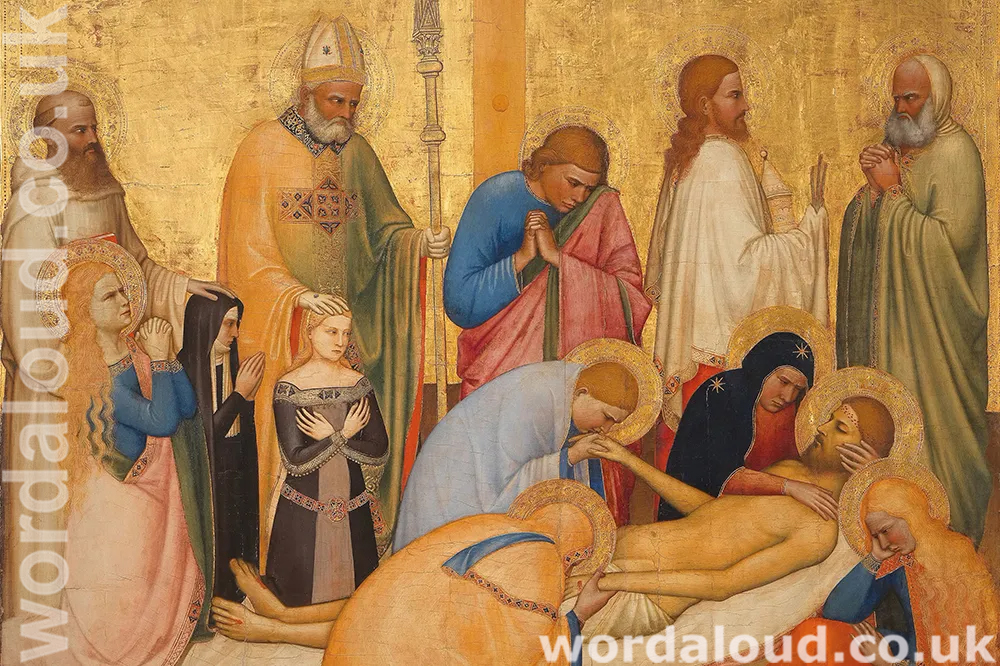Christian Art | Prayer With Jesus | Psalms | Folly Of Trust In Riches | King David As A Boy
Psalm 49 | King James Audio Bible
YouTube: Psalm 49 | KJV | King James Audio Bible | Word Aloud
Psalm 49 is a psalm of balance, expressing an engagement with life’s realities while maintaining a perspective beyond the material. The psalm examines pursuit of prosperity and calls for humility in recognizing ultimate limitations of material wealth. The psalm invites solace in redemption offered by the Divine, affirming such vanity of riches and that worth transcends wealth – money.
Psalm 49 calls for reflection—an opportunity to contemplate life’s fleeting nature. The psalm invites listeners to consider brevity of human existence. The psalm begins with a universal call: ‘Hear this, all people; give ear, all inhabitants of the world.’ This invitation extends to every soul, irrespective of circumstances, to heed God’s message.
The psalmist, with wisdom, enters into questions of human existence: pursuit of wealth, an illusion of invincibility such money can create, and ultimate limitations of earthly riches. ‘Both low and high, rich and poor, together,’ declares the psalmist, acknowledging that these reflections apply to all.
The psalmist channels divine wisdom to convey a fundamental understanding: the constraints of wealth. ‘Their inward thought is that their houses shall continue forever, and their dwelling places to all generations; they call their lands after their own names.’ Here, the psalmist highlights universal desire for a lasting legacy, often sought through accumulation of wealth, property, and influence. Such is an aspiration as old as civilization itself, and yet, as the psalmist reminds, even the most opulent estates eventually change hands, their grandeur fading.
Central to this psalm is the idea that, despite efforts to secure futures through wealth, humans are ultimately powerless in the face of mortality. ‘Nevertheless, man being in honour abides not; he is like the beasts that perish.’ The psalmist draws a parallel between humanity and the animal kingdom, emphasizing our shared fate—inevitable death.
This reflection on human mortality, though sombre, serves a profound purpose: redirecting focus from the transient to the eternal. The psalmist underscores a gift more precious than material wealth—the redemption of one’s soul. ‘But God will redeem my soul from the power of the grave; for He shall receive me.’ Here, the psalmist offers hope, reminding that while earthly treasures may fade, the soul’s destiny is not determined by possessions but by a relationship with God.

Psalm 49 | King James Audio Bible KJV | Love Revealed By Jesus Christ
Hear this, all ye people; give ear, all ye inhabitants of the world: Both low and high, rich and poor, together.
My mouth shall speak of wisdom; and the meditation of my heart shall be of understanding. I will incline mine ear to a parable: I will open my dark saying upon the harp.
Wherefore should I fear in the days of evil, when the iniquity of my heels shall compass me about?
They that trust in their wealth, and boast themselves in the multitude of their riches;
None of them can by any means redeem his brother, nor give to God a ransom for him: (For the redemption of their soul is precious, and it ceaseth forever:)
That he should still live forever, and not see corruption.
For he seeth that wise men die, likewise the fool and the brutish person perish, and leave their wealth to others.
Their inward thought is, that their houses shall continue forever, and their dwelling places to all generations; they call their lands after their own names.
Nevertheless man being in honour abideth not: he is like the beasts that perish. This their way is their folly: yet their posterity approve their sayings. Selah.
Like sheep they are laid in the grave; death shall feed on them; and the upright shall have dominion over them in the morning; and their beauty shall consume in the grave from their dwelling.
But God will redeem my soul from the power of the grave: for he shall receive me. Selah. Be not thou afraid when one is made rich, when the glory of his house is increased;
For when he dieth he shall carry nothing away: his glory shall not descend after him.
Though while he lived he blessed his soul: and men will praise thee, when thou doest well to thyself.
He shall go to the generation of his fathers; they shall never see light.
Man that is in honour, and understandeth not, is like the beasts that perish.
Key Themes Of The Psalm For Reflection | Love Revealed By Jesus Christ
- Meditation On Transience: The primary theme of Psalm 49 is a deep meditation on the transient nature of human existence. The psalmist calls upon people from all walks of life to listen and ponder this universal truth. This meditation urges individuals to consider the brevity of life, prompting reflection on the purpose and meaning of one’s time on Earth.
- Wealth And Its Illusions: A prominent theme of the psalm is the reflection on wealth and its illusory nature. The psalmist observes that people, regardless of their social or economic status, often become enamoured with the pursuit of wealth. They may believe that their riches will secure their futures and create a lasting legacy. This theme invites contemplation on the pursuit of material success and the false sense of security it can provide.
- Limitations Of Material Wealth: The psalmist emphasizes that material wealth has its limitations. Houses, lands, and possessions are acquired and passed down through generations, yet they do not endure forever. This theme encourages humility and a recognition of the ultimate limitations of earthly treasures, challenging the notion that wealth guarantees lasting significance.
- Human Mortality: Psalm 49 draws a striking parallel between humanity and the animal kingdom concerning mortality. It highlights the sobering truth that all living beings, regardless of their accomplishments or possessions, share a common fate—death. This theme serves as a reminder of the fragility of human life and the equalizing force of mortality.
- Redemption Of The Soul: Amid reflections on the fleeting nature of life and the limitations of wealth, the psalmist introduces a message of hope. The psalm points to the idea that true worth is not measured in material riches but in the redemption of the soul by God. This theme invites individuals to look beyond earthly pursuits and consider the eternal destiny of the soul as the ultimate treasure.








